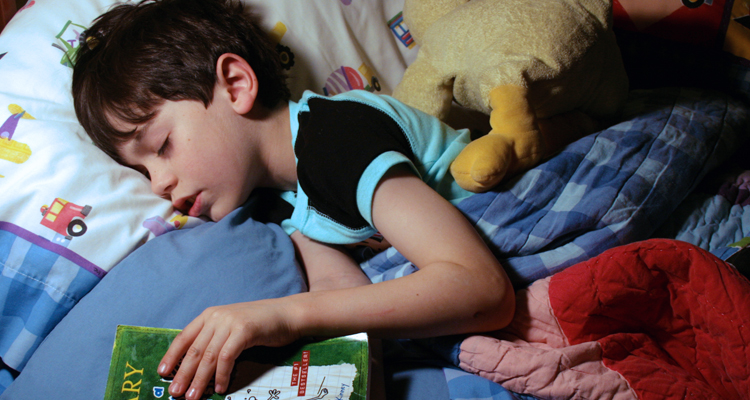After a summer of relaxed bedtimes, late nights, and lazy mornings it can be difficult for kids—and parents—to get back to business on the first day of school. Making a simple plan to ensure kids get enough sleep can help make the transition back to school easier.
How much sleep is enough?
Experts recommend that children 3–6 years old get 10–12 hours of sleep each day, on average. Younger kids may still nap during the day, while 5 and 6 year olds probably do not, so bedtimes may need to be adjusted earlier. Kids 7–12 years old should get 10–11 hours of sleep, and teens should sleep at least 8–9 hours. Many teenagers may actually need as much or more sleep than they did when they younger, but due to school and social pressures, may not get enough.
The right bedtime for children depends on any number of factors, including their age, whether they still take naps, school start times, and your family’s schedule. Many homeschoolers and online-schooling families find that one of the benefits of schooling at home is that kids are able to get more sleep. Teens in particular, can benefit from starting school later—which even some traditional schools have implemented—thanks to research that shows their internal clocks change, causing them to get tired later.
Numerous studies have shown the many benefits of getting enough sleep, including fewer behavior issues, decreased hyperactivity, increased ability to focus, better grades in school, and a reduced risk of obesity. Sleep may also play a role in higher IQ and better memory, and can help with stress and anxiety.
5 tips for establishing back-to-school bedtime routines
1. Start early. To make the shift to the school year schedule easier, start gradually, before school begins. A week or so before the first day of school, begin shifting bedtimes and wake-up times 10 minutes earlier each night to make the transition easier. If you have more time before school begins, start a month in advance, and move bedtimes by 15 minutes each week.
2. Plan morning activities. Before school begins, start getting kids and teens used to busy mornings by scheduling your final summer activities earlier in the day.
3. Unplug. Get the TV and other electronics out of the bedroom and establish a technology-free time (at least 15–30 minutes) to wind down each night before going to bed. Experts say that television, video games, and other electronics can make it more difficult to fall asleep, and can keep us from sleeping well.
4. Set the scene for bedtime. Have a routine for pre-bedtime activities to help children prepare for sleep. A bath or shower, dimmed lights, and quiet activities like reading books can help kids wind down.
5. Be consistent. As hard as it may be, stick to the schedule, even on weekends. Going to bed and waking up at the same time every day is important for your body’s internal clock and makes it easier to get refreshing sleep. This is especially crucial for teenagers who may be tempted to sleep in on weekends to make up for late nights studying or participating in extracurricular or social activities.
How do you encourage good sleep habits? Share your tips in the comments!
[schedule on=’2015-08-01′ at=”03:01″ expon=’2015-10-02′ expat=”23:55″] [/schedule]
[/schedule]
This article was updated August 2015
Image Credit – woodleywonderworks / CC by 2.0






















































































































